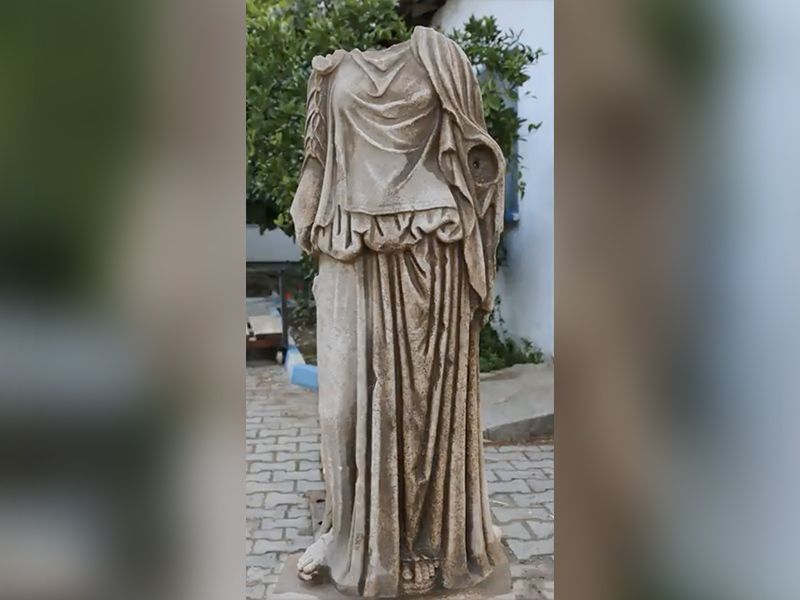Headless Statue of Ancient Woman Discovered in Turkey’s ‘Mother Goddess City’
The 1,800-year-old sculpture dates to Metropolis’ Roman era
Archaeologists have discovered an 1,800-year-old statue of a woman in the ancient city of Metropolis in western Turkey, reports the Hurriyet Daily News. The Turkish Culture and Tourism Ministry’s Department of Excavations announced the find on Twitter last week, sharing a video showing how the sculpture was unearthed.
“Our excavations will continue in 2021,” the ministry wrote.
In the video, workers in a walled area carefully remove earth from around the statue. The artwork is missing its head, but the rest is well-preserved and depicts a woman wearing flowing draped clothing.
As the state-run Anadolu Agency reports, the ministry and Celal Bayar University have been jointly studying the ancient city for years. Known as the “Mother Goddess City,” Metropolis was located 28 miles from the ancient port city of Ephesus and 25 miles from the modern Turkish city Izmir.
To date, archaeologists working at the site have unearthed artifacts and structures from the classical, Hellenistic, Roman, Byzantine and Ottoman periods. Finds include a Roman palaestra (wrestling hall), mosaics, ceramics, a council building and a columned gallery.
Per Voyage Turkey, Metropolis was built in the third century B.C., when the region was under the control of the Seleucid Empire. It reached its golden age during the Hellenistic period and served as a center of religious power during the Byzantine Period.
2021 yılı kazılarımız sürüyor. İzmir, Torbalı, Metropolis Antik Kenti kazılarından 1800 yıllık bir kadın heykeli... @muzeler_dairesi @ttkgovtr pic.twitter.com/iS113nNUo2
— Kazılar Dairesi Başkanlığı (@kazilar_) June 11, 2021
The statue’s age suggests it was made at a time when the Roman Empire controlled Anatolia (the part of Turkey located on the Asian continent). Rome established its Asia Minor province in the region, with Ephesus as its capital, in 133 B.C.
Earlier this year, archaeologists working at the Metropolis site announced the discovery of huge cisterns dated to the late Roman or early Byzantine period (around 284 to 750 A.D.). Capable of holding a total of around 600 tons of water, the cisterns probably supplied water to a bathhouse in the city and met Metropolis’ overall need for water when it was subjected to sieges that made other sources unavailable.
Excavations at Metropolis have been ongoing since 1990, according to the Sabanci Foundation, a philanthropic group that has supported the work. One of the most prominent features of the ancient city is a Hellenistic theater dated to the third century B.C. Roman-era structures discovered during digs include a sports complex, homes, shops, baths, a public toilet, streets and roads.
According to a separate Anadolu Agency article, researchers have also discovered thousands of small artifacts, including ceramics, coins, glass and statues, many of which are now on display at the Izmir Art and History Museum, Izmir Archaeology Museum and Selcuk Efes Museum.
/https://tf-cmsv2-smithsonianmag-media.s3.amazonaws.com/accounts/headshot/Livia_lg_thumbnail.png)
/https://tf-cmsv2-smithsonianmag-media.s3.amazonaws.com/filer/0a/d9/0ad99840-3b8f-471f-9ae4-1c000c68db76/statue_3.jpg)


/https://tf-cmsv2-smithsonianmag-media.s3.amazonaws.com/accounts/headshot/Livia_lg_thumbnail.png)